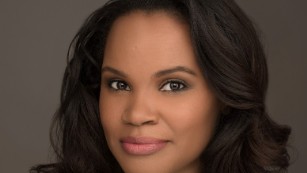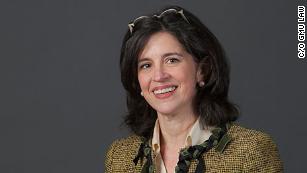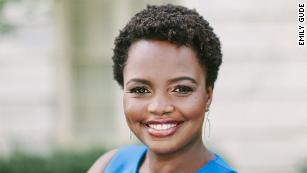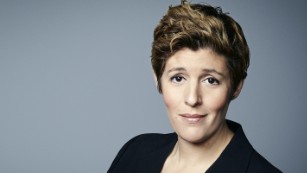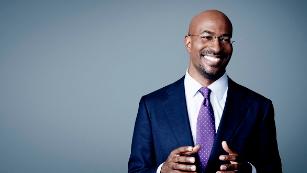Varying opinions, hence the IMPORTANCE of voting in this year's Mid-Term Elections
It's not the 'Year of the Woman.' It's the 'Year of the Women'
(CNN)Since the early primaries began for the 2018 midterm elections, it's been a year of firsts and to many, a year of the woman. In the midst of this election, the first significant national vote since the election of Donald Trump, Brett Kavanaugh's nomination and confirmation battle only amped up the existing pressure on questions of gender, power, women's health and women in elected office.
CNN Opinion asked thinkers to weigh in on 2018 as a Year of the Woman. The views expressed here are solely theirs.
Laura Coates: The only thing coming to save us is a ballot in shining armor
One can be heard without being listened to. Women voters have long felt the impact of this nuance, and the Kavanaugh confirmation hearing exemplified it. Both sides of the political aisle preached that women, particularly women alleging sexual misconduct, should be heard. Cries for due process, notice of the charges against someone accused and meaningful opportunity to be heard echoed throughout both chambers of Congress and reverberated throughout the nation. The actual mechanisms to facilitate sound were provided: a microphone, a camera, and a platform. The intangible mechanisms of listening, however, were regrettably absent. Women noticed.
Hearing is passive and non-purposeful. Listening is an action. Women voters should and are demanding more than patronizing passivity. As was the case in the year following Anita Hill's testimony more than a quarter century ago, women are keenly aware (perhaps now more than ever) that they cannot afford to wait for receptive ears. Women are prepared and capable of voting for (or being elected by) those whose policies in practice reflect our collective values, strengths, empathy, intellect, and power.
The Venus symbol for women is thought to represent a bronze mirror atop a handle. For at least the past two years, women have held a mirror up to America and recoiled at its reflection. The democratic fairy tale doesn't exist. The only thing coming to save us is a ballot in shining armor. When we raise our voices on Election Day to ask the proverbial "Mirror Mirror on the wall, who's the right candidate to listen to us all?" - - a woman will respond.
Laura Coates is a CNN legal analyst. She is a former assistant US attorney for the District of Columbia and trial attorney in the Civil Rights Division of the Department of Justice. She is the host of "The Laura Coates Show" on SiriusXM. Follow her @thelauracoates.
Helen Alvaré : A 'Year of the Woman' won't be enough
It's more than a little difficult to get excited about this so-called "Year of the Woman" in politics. While I would love to believe that a larger female share of federal lawmakers will mean a better life for US women, I don't have the evidence to support this, especially considering women's record since the last year of the woman, 1992.
I think this is because a lot of female politicians -- like a lot of male politicians -- mistake legalized abortion or free contraception for the sum of "feminism," while failing to solve the problems women suffer most.
Women are pro-life and pro-choice, while indisputably in serious need of other kinds of laws and policies. Women suffer more poverty than men and need state action prioritizing the poor. Women practice religion more than men, being more likely to pray daily, attend services weekly, and report that God is very important in their lives. Women are more likely than men to report that they would like to have more flexible work arrangements and paid family leave to care for loved ones.
To date, however, both female and male politicians spend most of their time attending to middle-class and wealthier Americans. And I can't point to sustained, bold action on the part of female representatives on religious freedom or paid or flexible leave.
I haven't given up hope that elected women will bring women's needs to the table more forcefully. I am only saying that their sex doesn't guarantee it, and that female citizens will not be absolved of their duty to agitate for what women need most.
Helen Alvaré is a professor of law at George Mason University who has published widely on issues of marriage, family, parenting and First Amendment religion clauses. Her recent book with Cambridge University Press is about putting children's interests first in US family law.
Karine Jean-Pierre: If 1992 was Year of the Woman, 2018 must be Year of Accountability
The year 1992 was the first election year to be proclaimed the "Year of the Woman." It was the year after the Anita Hill hearings -- and the year when an unprecedented number of women ran for office. Illinois' Carol Moseley-Braun won her race, becoming the first black woman ever elected to the Senate. Along with her, a wave of women took political office.
Now, in 2018, it's been 26 years since the "Year of the Woman" -- and yet, we still live in a country where women are treated as lesser, where medicine is designed often without women in mind, where maternal mortality rates are far higher than those of our peer countries. And where a man credibly accused of sexual assault and harassment can still be confirmed to the US Supreme Court.
In 2018, another "Year of the Woman" won't be enough. It isn't enough to elect women -- though we urgently should do that. And it isn't enough to believe women like Dr. Christine Blasey Ford if you still choose to confirm her alleged attacker to the Supreme Court.
So if 1992 was the "Year of the Woman", then 2018 must be the "Year of Accountability." And in the "Year of Accountability", we must demand accountability from everyone who fails to support women and our needs, no matter their race, gender, or political party.
We will demand accountability from the 45 men who voted for Brett Kavanaugh, as well as Susan Collins and the four other Republican women in the Senate who joined her.
We will demand accountability from the 53% of white women who voted for Donald Trump.
We will demand accountability from every member of Congress and local government who fails to adequately address the maternal health crisis that disproportionately affects black women.
In 1992, the "Year of the Woman" was an important and consequential feat, bringing our country's electoral representation closer to our demographics. But we've learned from time and experience, and from our greatest teachers, that simply supporting women isn't enough. In 2018, women need more than just support and votes. We need full accountability.
Karine Jean-Pierre is the senior adviser and national spokeswoman for MoveOn. She is also a lecturer in international and public affairs at Columbia University.
Sally Kohn: Win or lose, women are changing politics, permanently
No matter what happens on Tuesday, the record number of women running for election this year is undoubtedly going to change politics permanently, for the better. But what's also significant is that many of the women running aren't conventional candidates. These aren't elite career politicians making their run at the next rung of politics. They're single moms and school teachers and public interest lawyers who want to make a difference for their communities and their countries.
Take Kara Eastman, a Democrat running in Nebraska's 2nd Congressional District. Raised by a single mom, Eastman started the Omaha Healthy Kids Alliance to ensure that children have access to homes free of lead and other environmental hazards. And she was on the board of her region's community college. She's running against an incumbent Republican who has vowed to gut the Environmental Protection Agency and Department of Labor.
Or consider Katie Porter, a Democrat running for California's 45th Congressional District. Porter has spent her career as a consumer protection attorney going after big banks financial institutions that cheat consumers. She teaches consumer law and was appointed a few years ago by then-California Attorney General Kamala Harris to be the state's watchdog against big banks. Porter is running against a Republican incumbent who was an investment banker until entering politics 22 years ago.
A community-based environmental activist challenging an anti-EPA climate-change denier and a banking consumer watchdog challenging a big-bank friendly career politician. These challengers aren't just changing politics because they're women. They're changing the game with their range of expertise and experience they bring to the table as candidates who represent real people and their concerns, not just special interest elites. Politics will hopefully never be the same.
Sally Kohn is a CNN political commentator and author of the book, "The Opposite of Hate."
Van Jones: Women of color are starting to get the respect that they deserve
A scandal-tarred, extremist Republican. Accusations of sexual misconduct. A southern state where Democrats rarely compete. Attempts to suppress the black vote. A multi-racial, populist coalition putting in the work.
That was the scene in December 2017, when Doug Jones upset Roy Moore in a special election for Alabama's Senate seat.
Now, with 2018 tagged as a successor to 1992's "Year of the woman," that Alabama contest deserves a second look. In the wake of Jones' surprise victory, it quickly became clear who was responsible for it: black women. Black women put in the long hard volunteer hours. Black women got their families, friends, neighbors and churches to the polls. Black women voted 98%for Doug Jones.
It is really no surprise. Black women have been the backbone of the Democratic Party for decades. All that has changed is that women of color are starting to get the credit they deserve.
They are also in leadership roles. That is an overdue and welcome development. From Ayanna Pressley in Massachusetts to Ilhan Omar in Minnesota to Stacey Abrams' historic bid for governor in Georgia, black women are not just singing in the choir but preaching from the pulpit.
That fact is even more true when you pull back the lens and look at the waves of all women of color -- Native American, Palestinian, Latina, more than I can mention -- determined to make history in November. In the GOP stronghold of Idaho, a young Democrat named Paulette Jordan could become the first-ever Native American governor.
With all the attention on the new "Year of the woman," I hope we do not lose sight of the beautiful rainbow of women of color who are leading the charge and organizing behind the scenes. Whether or not a blue wave materializes, their voices and concerns deserve to be at the center of conversation in 2019 and beyond.
Van Jones is the host of the "The Van Jones Show" and a CNN political commentator. He is the co-founder of #cut50, a national, bipartisan criminal justice initiative of the Dream Corps.

